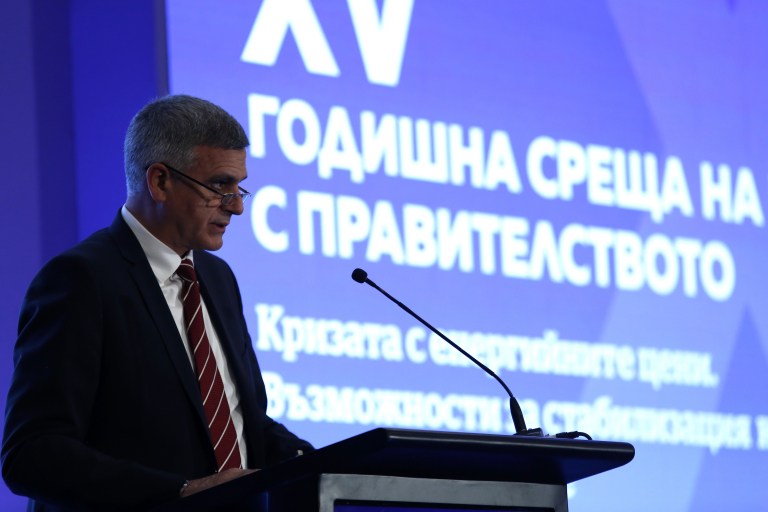
11.10.2021
“While I welcome the green idea as a design and a needed investment in the future, I believe that it is irrational and irresponsible to turn a blind eye to the challenges that we face in the implementation process. The problems that we are currently observing in the energy resources market are just some of the implications therefrom.” This was stated by Prime Minister Stefan Yanev at the 15th annual Business-Government Meeting. The Prime Minister stressed the need to seek common solutions both at national and supranational level to minimize the negative social and economic impacts of the green transition. “These solutions should allow certain flexibility so that the national governments can react timely to protect their economic and social systems in the adverse circumstances like the current ones – the prices of electricity and of key energy sources. As we protect the national systems, we protect the common European system,” Mr. Yanev noted.
Prime Minister Stefan Yanev said that it was time for adjustments in the Green Deal paradigm and in the tools to implement it so that it could lead to the desired results within the set time frames. “I don’t want to be misunderstood – the call for flexibility and adjustments that will eliminate the deficiencies in the concept is by no means an abdication from our commitment to clean energy, to nature conservation and to the achievement of EU climate neutrality. I do believe that this is an investment in our common future. However, we must move prudently along this path as we maintain our economic and social vitality, respectively our national security”, the Prime Minister said firmly.
Prime Minister Stefan Yanev pointed out that Bulgaria ranks among the largest emitters of carbon dioxide within the EU and that the transition to decarbonization is associated with a number of challenges. In his words, the businesses and the communities need help in order to adjust. In this sense the Prime Minister stressed the need to ensure that the transition would be smooth, fair and consistent with the specifics of each national economy. Further, Mr. Yanev said that the Bulgarian Government builds on the decarbonization efforts in line with the Commission’s recommendations. Also, the Prime Minister noted that the caretaker cabinet makes every effort to extend the coal phase-out deadline and make it 2040 and that by the end of this week the outcome of the talks with Brussels will be known.
Prime Minister Stefan Yanev underlined the need to work out a transition strategy that would get a broad public debate and an approval by the Bulgarian Parliament. “No one should be neglected,” the Prime Minister said firmly and then added that concerns over the rising energy prices Europe-wide were understandable. The Prime Minister also pointed out the series of actions that the caretaker government had taken to protect businesses in Bulgaria against the rising prices. Inter alia, Mr. Yanev underscored the possibility to establish a clearing house and to improve the stock market operation. Further, the Prime Minister said that a workgroup had been set up on his order to map out an energy strategy. The workgroup is to prepare the soil for a meaningful debate on nuclear power to which, in the Prime Minister’s opinion, there is no alternative in terms of ensuring the energy system’s sustainability.
Regarding the Bulgarian National Recovery and Resilience Plan, Prime Minister Stefan Yanev noted that it is being finalized. The Prime Minister stressed the importance of the plan to recover the potential of economic growth after the blow struck by the pandemic. Mr. Yanev named the four pillars around which the Plan is structured: Innovative Bulgaria, with a focus on the competitiveness of the economy and on smart growth; Green Bulgaria, with a focus on the natural resources management; Connected Bulgaria, with a focus on the development of the country’s regions; Fair Bulgaria, with a focus on inclusive and sustainable growth.
In his speech at the forum Prime Minister Stefan Yanev also stressed the need of having an effective and predictable institutional environment in place, with clearly defined and inflexible rules that are observed by everyone. The Prime Minister indicated that despite its limited powers the caretaker government can boast a number of achievements of relevance and expressed his hope that a regular government would continue them in the future. Mr. Yanev cited as examples the fight against corruption and against public funds misspending; the revitalization of the Security Council; the measures related to the Global Magnitsky Act; the reform of the modus operandi so that the public administration works for the sake of the public interest; higher tax revenues on a national scale; the optimization of the Bulgarian Development Bank (BDB); the active policy pursued to join the OECD. The Prime Minister recalled that the caretaker government submitted to Parliament a State Budget update to ensure the implementation of key policies in the context of the Covid crisis. “We have set an example how to work in the national interest,” the Prime Minister said.
The Prime Minister also drew attention to the crisis of political representation and the dominant populism. Prime Minister Stefan Yanev noted as a problem the lack of solidarity and of national priorities, a national goal and a course as a result of a general consensus reached. “I bring these issues to the attention of the public as I want Bulgarian citizens to be more active in all matters of our common future and I don’t want them to be afraid to be politically active. Bulgaria needs people who are willing to work for the homeland,” the Prime Minister said.